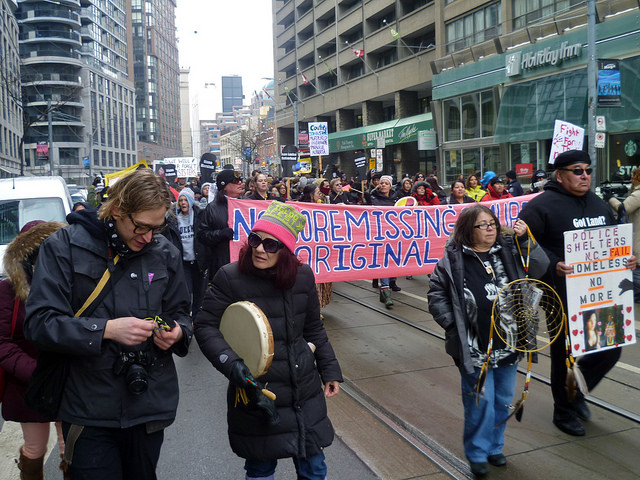More needs to be done by the government to address the ongoing crisis of Missing and Murdered Indigenous Women in B.C. and the rest of Canada, according to a report released by a human rights group earlier this week.
The Inter-American Commission on Human Rights (IACHR) have been studying the issue since 2012 when the organization held a hearing on “The Situation of Aboriginal Women and Girls in Canada” at the request of the Native Women’s Association of Canada (NWAC) and other feminist groups.
“This report is groundbreaking,” said NWAC Vice-President Dawn Harvard in a press release. “It is the first in-depth examination by an expert human rights body of the murders and disappearances of Indigenous women in Canada.”
The report recommends that the Canadian government “provide a national coordinated response to address the social and economic factors that prevent indigenous women from enjoying their social, economic, cultural, civil and political rights, the violation of which constitutes a root cause of their exposure to higher risks of violence.”
In addition, the report concludes that greater due diligence needs to be done by police enforcement.
In September, the federal government promised a $25 million five-year plan to address the high rates of violence toward aboriginal women and girls.
But Prime Minister Stephen Harper has repeatedly rejected inquiries into the issue and told CBC’s Peter Mansbridge in his yearly interview that the crisis is not on his radar.
One of the conclusions reached by the IACHR is the implementation of a national inquiry in collaboration with aboriginal people and leaders is needed.
The Liberal Party has called for a public inquiry. “The prime minister’s shocking indifference to this ongoing tragedy is not only a national disgrace, but an international embarrassment,” said Liberal Critic for Aboriginal Affairs Carolyn Bennett in a statement.
The NDP has stated that it would launch an inquiry into missing and murdered indigenous women in its first 100 days if elected.
“In Canada, Aboriginal women are seven times more likely to be murdered than non-Aboriginal women,” said NDP Critic for Aboriginal Affairs Jean Crowder. “This is unacceptable. The Conservatives need to accept that this violence is systemic and we need to deal with the underlying causes.”
The IACHR report states that the root causes of high levels of violence experienced by aboriginal women and girls are “related to a history of discrimination beginning with colonization and continuing through inadequate and unjust laws and policies such as the Indian Act and forced enrollment in residential schools that continue to affect them.”
Aboriginal women make up 16 per cent of total female homicides in Canada even though Indigenous women are only 4.3 per cent of the population, the report stated. They are three times more likely to experience a violent crime compared to their non-Aboriginal counterparts.
However, statistics on the total number of Missing and Murdered Indigenous Women in Canada have not been maintained by the government through the years due to the lack of reliable sources or data. In 2010, the government cut funding to a research database project started by NWAC that gathered data on Missing and Murdered Indigenous Women.
The IACHR study has also found support from the Assembly of First Nations (AFN), who are scheduled to hold a roundtable on this issue next month. Newly elected National Chief Perry Bellegarde has stated that he will work towards establishing an inquiry into Missing and Murdered Indigenous Women.
“The IACHR has concluded that the response of governments in Canada to date to this national crisis amounts to a violation of the right to life for Indigenous women,” Bellegarde said in a statement. “We must act together to establish both a national inquiry to examine these critical human rights failings and move at the same time a national action plan.”
Francella Fiallos is a fourth year journalism student at Carleton University in Ottawa. She sits on the board of directors at OPIRG-Carleton, edits a campus newspaper, and hosts a radio show on 93.1 FM CKCU in the capital region.



